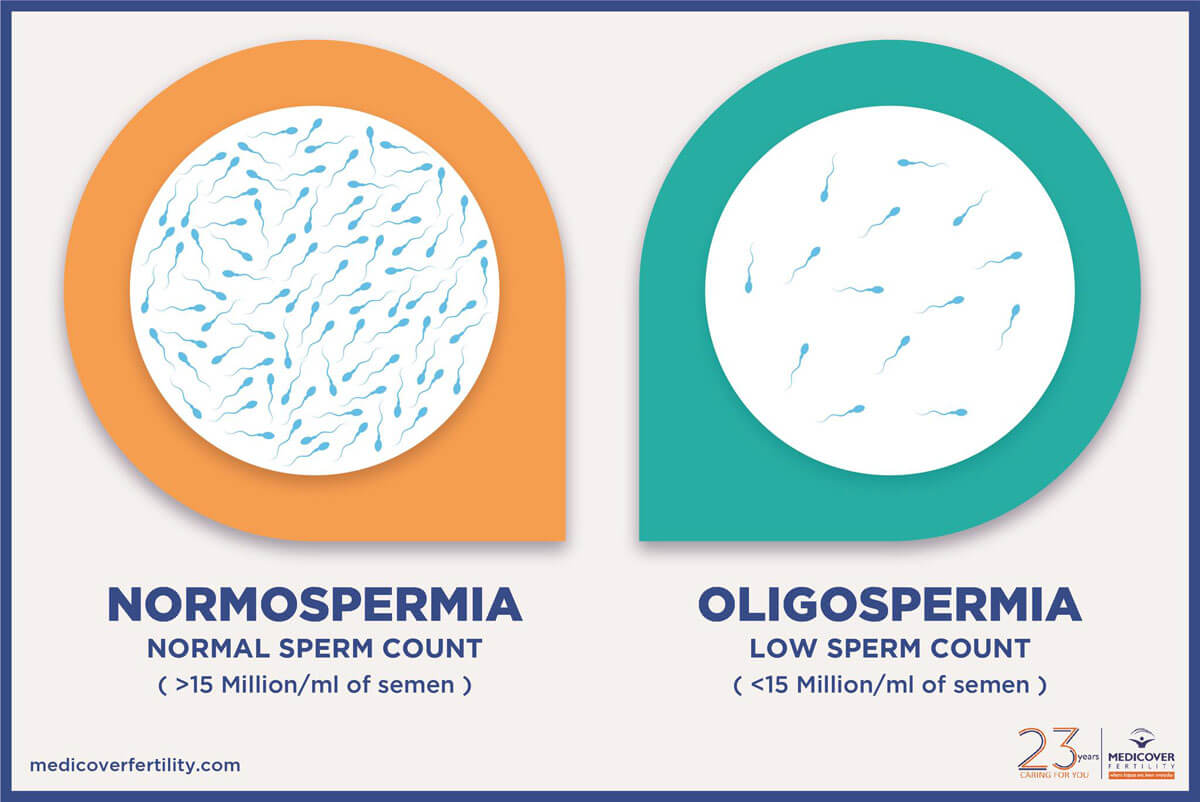Infertility is defined as a couple’s inability to become pregnant after a year of regular and unprotected sex. Studies suggest that after 1 year of having unprotected sex, 15% of couples are unable to conceive, and after 2 years, 10% of couples still have not had a successful pregnancy. In couples younger than age 30 who are generally healthy, 20% to 37% are able to conceive in the first 3 months.
In Nigeria, most often, the woman is always accused of not being able to conceive and is subjected to lots of criticism.This is very common in most tribes in Nigeria. However, Medical science has shown that men are the cause of one-third of infertility cases and this isn’t well spoken of.
Infertility in men is defined as the inability of a man to get a fertile female pregnant after having frequent and unprotected intercourse for a year.
To conceive a child, a man’s sperm must combine with a woman’s egg. The testicles make and store sperm, which are ejaculated by the penis to deliver sperm to the female reproductive tract during sexual intercourse.
Sperm Count
The most common issues that lead to infertility in men are problems that affect how the testicles work in producing sperm. Other problems are hormone imbalances or blockages in the male reproductive organs which also causes a lack of sperm production which causes a man to produce less sperm than normal. When this happens, it leads to a problem called Low Sperm Count – medically called Oligospermia. Sometimes, there is no sperm at all, and this condition is known as azoospermia.
Sperm count refers to the average number of sperm present in one sample of semen. A sperm count is considered ‘NORMAL‘ when a male ejaculates around 15 million sperm per millilitre of semen. It is called Normospermia. Anything lower than 15 million sperm per millilitre of semen is considered Abnormal – referred to Low Sperm Count.
The low sperm count condition decreases the odds of conception during unprotected sex or intercourse. It does not eliminate the possibility of pregnancy but lowers the chances of pregnancy and fertilization of the egg.

Causes of Low Sperm Count
Varicocele: Varicocele occurs when blood doesn’t move through the veins like it should and begins to pool in the vein, causing it to enlarge. A varicocele develops slowly over time. They can be found in 15 percent of the adult male population and around 20 percent of adolescent males. They’re more common in males aged 15 to 25.
Drug use & Alcohol Intake: Anabolic steroids taken to stimulate muscle strength and growth can cause the testicles to shrink and sperm production to decrease. Use of cocaine or marijuana might reduce the number and quality of your sperm as well.
Drinking alcohol can also lower testosterone levels and cause decreased sperm production.
Occupation: Certain occupations might be linked with a risk of low sperm count, including welding or those associated with prolonged sitting, such as truck driving. Also, occupations that demand the use of hot objects around the pubic regions of a man can affect sperm production. An example is the use of laptops constantly on the laps.
Smoking: Men who smoke might have a lower sperm count than those who don’t smoke. A 2016 meta-analysis that reviewed the results of over 20 studies with a total of nearly 6,000 participants found that smoking consistently reduced sperm count.
Emotional stress: Severe or prolonged emotional stress, including stress about fertility, might interfere with hormones needed to produce sperm. Stress may reduce your sexual satisfaction and impair your fertility. This is because when the body is stressed, it conserves energy and focuses on surviving, rather than reproducing.
Weight: Obesity can impair sperm production in several ways, including directly impacting sperm and by causing hormone changes that reduce male fertility. Several studies on overweight or obese men have shown that sperm count increased when they lost weight, in some cases by as much as 95%. It’s an important part of making sure the body is healthy, so ensure you’re switching off early enough.
Infection: Sexually transmitted infection is said to cause a decrease in sperm count. Some infections can interfere with sperm production or sperm health or can cause scarring that blocks the passage of sperm. These include inflammation of the epididymis (epididymitis) or testicles (orchitis) and some sexually transmitted infections, including gonorrhea or HIV.
Prevention
To protect your sperm production, avoid known factors that can affect sperm count and quality. These include:
Quit smoking.
Limit or abstain from alcohol.
Steer clear of illicit drugs.
Talk to your doctor about medications that can affect sperm count.
Maintain a healthy weight.
Avoid heat.
Manage stress.
Avoid exposure to pesticides, heavy metals and other toxins.
Having a computer on the lap all the time really does damage to the production of sperms. Laptops, saunas, hot tubs and even tight boxers cause overheating, which damages the sperm.
Diagnosing Low Sperm Count in men
IntraCytoplasmic Sperm Injection, is usually recommended for couples where male infertility is a problem, especially relating to the number or quality of sperm produced. Here are other various methods of diagnosis that a healthcare professional can use to determine the exact condition:
Scrotal ultrasound: This test uses high-frequency sound waves to look at the testicles and supporting structures.
Hormone testing: Your doctor might recommend a blood test to determine the level of hormones produced by the pituitary gland and testicles, which play a key role in sexual development and sperm production.
Post-ejaculation urinalysis: Sperm in your urine can indicate your sperm are travelling backward into the bladder instead of out your penis during ejaculation. This is called retrograde ejaculation.
Genetic tests: When sperm concentration is extremely low, genetic causes could be involved. A blood test can reveal whether there are subtle changes in the Y chromosome — signs of a genetic abnormality. Genetic testing might also be ordered to diagnose various congenital or inherited syndromes.
Testicular biopsy:This test involves removing samples from the testicle with a needle. The results of the testicular biopsy can tell if sperm production is normal. If it is, your problem is likely caused by a blockage or another problem with sperm transport. However, this test is typically only used in certain situations and is not commonly used to diagnose the cause of infertility.
Transrectal ultrasound: A small lubricated wand is inserted into your rectum to check your prostate and check for blockages of the tubes that carry semen (ejaculatory ducts and seminal vesicles).
Anti-sperm antibody tests: These tests are used to check for immune cells (antibodies) that attack sperm and affect their ability to function.
Treatment of Low Sperm Count

The best way to increase sperm count naturally may be to increase the consumption of foods high in sperm-friendly nutrients, such as vitamin C, antioxidants, and polyunsaturated fats. Other ways of treating low sperm count are:
Get enough exercise and sleep: Several studies have suggested that weight loss and exercise among people with overweight or obesity can lead to an improved or increased sperm count.
Get enough zinc: Zinc is an essential mineral found in high amounts in animal foods, such as meat, fish, eggs, and shellfish. It improves the overall health of sperm, including concentration and count.Taking zinc supplements increases testosterone levels and sperm count in those who are low in zinc.
Surgery. For example, a varicocele can often be surgically corrected or an obstructed vas deferens can be repaired. Prior vasectomies can be reversed. In cases where no sperm are present in the ejaculate, sperm can often be retrieved directly from the testicles or epididymis using sperm retrieval techniques.
Treating infections: Antibiotics can cure an infection of the reproductive tract, but this doesn’t always restore fertility.
Treatments for sexual intercourse problems: Medication or counseling can help improve fertility in conditions such as erectile dysfunction or premature ejaculation.
Hormone treatments and medications: Your doctor might recommend hormone replacement or medications in cases where infertility is caused by high or low levels of certain hormones or problems with the way the body uses hormones.
Assisted reproductive technology (ART): ART treatments involve obtaining sperm through normal ejaculation, surgical extraction or from donor individuals, depending on your specific situation and wishes. The sperm are then either injected into the female vaginal canal, utilized in IVF, or injected directly into the cytoplasm.

Discussion about this post